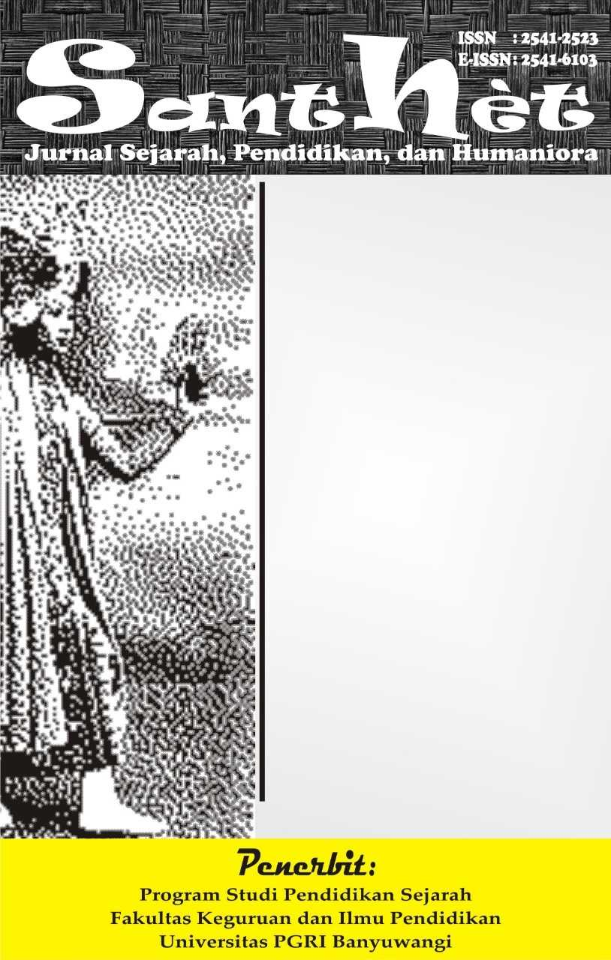THE EFFECT OF BLOG MEDIA ON STUDENTS' KNOWLEDGE COMPETENCY IN HISTORY SUBJECTS
Pengaruh Media Blog terhadap Kompetensi Pengetahuan Siswa pada Mata Pelajaran Sejarah
DOI:
https://doi.org/10.36526/santhet.v9i6.5713Keywords:
Blog Media, Students, Knowledge Competency, History SubjectsAbstract
This study aims to determine the effect of using blog media on students' knowledge competence in history subjects. This research used experimental method, type of quasi experiment with nonequivalent control group design. The research was conducted at SMA Negeri 2 Pontianak. The sampling technique used cluster sampling technique. Data collection techniques using tests with research instruments knowledge competency assessment sheet in the form of multiple choice questions. The statistical test results showed that there was abnormal data, so the statistical test used in this study was a nonparametric statistical test, U Mann Whitney. The statistical test results showed the posttest value of the experimental and control classes was 0.248. Because the value of Asymp. Sig. (2-tailed) > 0.05, then there is no effect of using blog media on students' knowledge competence in history subjects. It can be concluded that, there is a difference in the average value of the experimental class and the control class but there is no effect of using blog media in increasing students' knowledge competence in history subjects.
References
Agobos. (2011). Langsung jago bikin website-gratis. Agogos Publishing.
Babalola, E. O., & Adedokun-shittu, N. A. (2024). Embracing Digitalization in Higher Education : A Constructivist. 4(2), 297–306.
Creswell, J. W. (2016). Reserch design: Pendekatan metode kualitatif, kuantitatif dan campuran edisi keempat. Pustaka Belajar.
Dani, N. R., & Selaran, P. (2019). Peningkatan Motivasi Siswa Kelas V pada Pembelajaran IPA melalui Model Explicit Instruction di Sekolah Dasar. Volume, 19(2), 114–120. oi: https://doi.org/10.24036/pedagogi.v19i2.655
Demetriou, K. (2023). Strengths and weaknesses of using educational technology in inclusive settings with limited available resources: reflections on a classroom-based computer-mediated collaborative learning approach. International Journal of Learning Technology, 18(3). https://www.inderscienceonline.com/doi/pdf/10.1504/IJLT.2023.134582
Hamdani, D. (2011). Penerapan Model Pembelajaran Koopeartif dengan Memanfaatkan Web Blogspot sebagai Media Pembelajaran untuk Meningkatkan Hasil Belajar Fisika Siswa Pada Konsep Suhu dan Kalor di Kelas XE SMAN 06 Kota Bengkulu. Jurnal Exacta, IX(1), 9–15.
Harrell, S., & Bynum, Y. (2018). Factors Affecting Technology Integration in the Classroom, Alabama Journal of Educational Leadership. Alabama Journal of Educational Leadership, 12–18. https://eric.ed.gov/?id=EJ1194723
Hasan, S. H. (2019). Said Hamid Hasan Pendidikan Sejarah untuk Kehidupan Abad Ke 21 M. HISTORIA: Jurnal Pendidik Dan Peneliti Sejarah, II(2), 61–72.
Judijanto, L., Atsani, M. R., & Chadijah, S. (2024). Trends in The Development of Artificial Intelligence-Based Technology in Education. International Journal of Teaching and Learning (INJOTEL), 2(94), 14–30. https://doi.org/10.35330/1991-6639-2020-2-94-14-30
Kemendikbud. (2017). No Title). Panduan Penilaian oleh pendidik dan satuan pendidikan sekolah menengah atas. Kemendikbud.
Kosasih, E. (2013). Strategi belajar dan pembelajaran implementasi kurikulum 2013. Yrama Widy.
Lubis, I. R. B. (2019). Pemanfaatan Blogspot Sebagai Media Dan Sumber Belajar Pada Mata Kuliah Strategi Pembelajaran Aqidah Akhlak Mahasiswa PAI Universitas Islam Negeri Sumatera Utara Medan. Universitas Sumatera Utara.
Martina, M., Rustiyarso, R., & Sulistyarini, S. (2024). Implementation of Web Blog-Based E-Learning Media to Improve Students’ Response and Interest in Sociology Learning for Class XI IPS 2. Jurnal Pendidikan Sosiologi Dan Humaniora, 15(1), 120. https://doi.org/10.26418/j-psh.v15i1.76389
Maslin, N. M. (2021). Impact of Modern Technology. HF Communications, 3, 165–182. https://doi.org/10.1201/b12574-14
Nicolaou, C., Matsiola, M., & Kalliris, G. (2019). Technology-enhanced learning and teaching methodologies through audiovisual media. Education Sciences, 9(3). https://doi.org/10.3390/educsci9030196
Nugroho, A. A. (2017). Pengembangan media pembelajaran berbantuan blog pada materi trigonometri. Universitas Negeri Raden Intan.
Sayono, J. (2013). Pembelajaran Sejarah di Sekolah: dari Pragmatis ke Idealis. Sejarah Dan Budaya, 7(1), 9–17.
Schroeder, A., Minocha, S., & Schneider, C. (2010). The strengths, weaknesses, opportunities and threats of using social software in higher and further education teaching and learning. Journal of Computer Assisted Learning, 26(3), 159–174. https://doi.org/10.1111/j.1365-2729.2010.00347.x
Shatri, Z. G. (2020). Advantages and disadvantages of using information technology in learning process of students. Journal of Turkish Science Education, 17(3), 420–428. https://doi.org/10.36681/tused.2020.36
Solomon, G., & Schrum, L. (2011). WEB 2.0 Panduan bagi Para Pendidik. Indeks.
Torakulovich, M. O. (2024). Application of Basic Principles and Rules of Innovative. In Международная Конференция Академических Наук, 3(1), 46–55.
van Laar, E., van Deursen, A. J. A. M., van Dijk, J. A. G. M., & de Haan, J. (2017). The relation between 21st-century skills and digital skills: A systematic literature review. Computers in Human Behavior, 72, 577–588. https://doi.org/10.1016/j.chb.2017.03.010





























